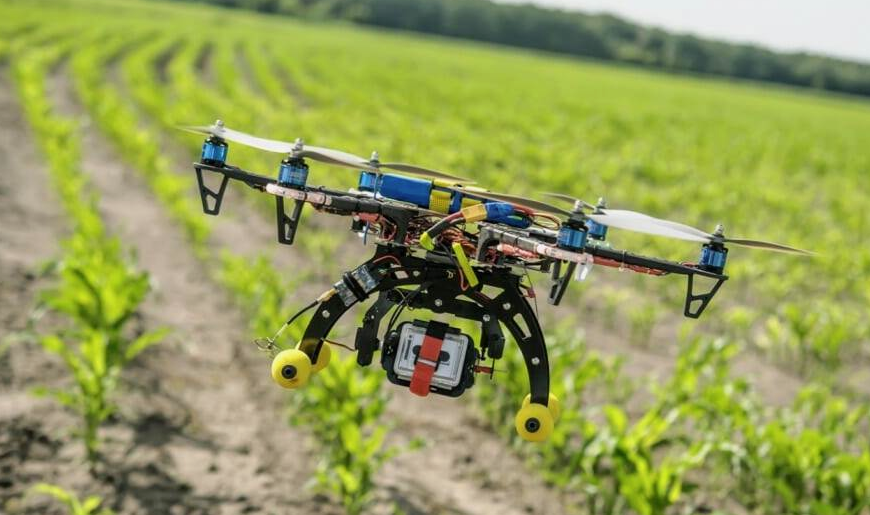Artificial intelligence is revolutionizing the agriculture industry by offering farmers innovative tools to increase productivity, optimize resources, and promote sustainability. Integrating AI technologies is shifting agriculture from traditional practices to intelligent, data-driven solutions.
Did you know that AI is being used in various ways, from drones that monitor crop health and detect early signs of disease to advanced predictive models that forecast the best times for planting, irrigation, and harvesting?
This transformation helps farmers make informed decisions and enables them to manage resources more efficiently, reduce waste, and ultimately boost crop yields while supporting long-term agricultural sustainability.
Read on to explore how AI enhances every farming stage, from planting to harvest.
AI Enhances Crop Monitoring with Drones
One of the most significant advancements in modern farming is using drones equipped with AI to monitor crops from the sky. These drones can take high-resolution images of fields and use AI algorithms and powerful AI PC to analyze the health of crops in real-time.
The future of smart farming in France is set to be revolutionized by cutting-edge technologies like Carbon Robotics’ LaserWeeder™.
This innovative machine uses advanced artificial intelligence (AI), deep learning, and high-powered lasers to tackle one of the most persistent challenges in agriculture: weed control.
With the help of AI, drones can detect early signs of disease, pest infestations, or nutrient deficiencies, allowing farmers to take corrective actions swiftly. This helps prevent large-scale crop damage and reduces the need for chemical treatments, leading to healthier crops and a more sustainable farming environment.
Moreover, AI-powered drones can generate precise maps of crop fields, giving farmers a detailed view of their land’s condition. Paired with an AI PC featuring advanced processing power and machine learning capabilities, farmers can quickly analyze this data to make informed decisions.
This data enables farmers to implement precision agriculture techniques, where resources like water, fertilizers, and pesticides are used more efficiently, minimizing waste and maximizing yield.
AI Predicts Harvest Yields Using Advanced Analytics
AI’s ability to analyze vast amounts of data and identify patterns is revolutionizing farmers’ prediction of harvest yields. By utilizing AI analytics, farmers can access detailed insights into crop growth, weather conditions, soil health, and other factors that affect yield.
The better use of data and technologies like AI to inform decision-making promises to put agribusinesses on a path to address these challenges so that enterprises (many of which include their farming operations or collaboration with other farmers) can improve their business processes.
- AI systems can accurately forecast harvest outcomes by analyzing historical data alongside real-time information. This helps farmers plan better and make informed decisions regarding resource allocation, labor, and marketing strategies.
- AI can also predict the impact of external variables like climate changes or soil variations on crop yields. These predictions allow farmers to prepare in advance for potential challenges, ensuring that they can take appropriate measures to mitigate risks and optimize production.
AI Optimizes Soil Health with Smart Sensors
Soil health is crucial to the success of any farming operation, and AI is helping farmers maintain optimal soil conditions. Smart sensors powered by AI are placed in the soil to collect data on various factors such as moisture, temperature, and nutrient lev
AI algorithms then analyze this data, providing real-time recommendations for maintaining healthy soil. By using AI to optimize soil health, farmers can improve crop yields while conserving resources like water and fertilizer.
- For example, Automating can alert farmers when the soil is too dry or when nutrients are lacking, enabling precise interventions. This approach helps prevent over-irrigation, soil degradation, and nutrient runoff, contributing to more sustainable farming practices.
AI Automates Farming Operations for Greater Efficiency
The automation of farming tasks is another area where AI is making a significant impact. AI-driven robots and machinery are increasingly used to perform routine tasks such as planting, harvesting, and weeding. These machines can operate autonomously, reducing the need for manual labor and improving the overall efficiency of farming operations.
AI-enabled automation also allows precision farming techniques, where tasks like planting seeds at the optimal depth and spacing or harvesting crops e are performed with incredible accuracy. This level of automation reduces human error, improves productivity, and ensures that resources are used as efficiently as possible.
AI Leverages Precise Irrigation and Water Management
Water management is a critical concern in agriculture, as fields are affected by drought or water scarcity. AI is helping farmers optimize irrigation practices by providing precise water usage and crop needs data.
AI sensors conserve water andels, weather forecasts, and crop water requirements to determine the exact amount of water needed for each section of the field.
With AI-powered irrigation systems, farmers can significantly reduce water waste by ensuring that water is applied only when and where it’s needed. This not only conserves water but also promotes healthier crops by preventing overwatering, which can lead to root rot and other issues.
AI Improves Harvest and Predictive Models
One of AI’s most valuable applications in farming is its ability to predict the ideal harvest time. AI algorithms analyze data from various sources, including climate conditions, crop growth rates, and soil health, to determine when crops will reach their peak. This allows farmers to harvest crops at the optimal time for maximum yield and quality.
Accurately predicting harvest timing helps farmers avoid under- or overripeness, ensuring that crops are harvested at their best. It also helps with logistics, as farmers can plan for storage, transportation, and distribution in advance.
AI Drives Sustainable Agriculture with Innovative Solutions
The future of farming lies in sustainable agriculture, and AI makes sustainable farming operations environmentally friendly. By optimizing resource use, reducing waste, and improving crop yields, AI helps farmers adopt practices that have less environmental impact.
- AI-powered technologies can monitor factors like carbon emissions, water usage, and soil health to ensure that farming operations are sustainable.
- AI is also helping farmers move toward regenerative agriculture practices, which focus on rebuilding soil health and biodiversity.
With AI’s predictive capabilities and real-time data analysis, farmers can implement strategies that work with nature to restore ecosystems, reduce greenhouse gas emissions, and promote biodiversity.
Conclusion
AI is undoubtedly changing the face of agriculture, from the skies above to the fields below. AI is making farming more efficient, sustainable, and profitable by enhancing crop monitoring with drones, predicting harvest yields, optimizing soil health, automating farming operations, and improving irrigation practices.
As AI continues to evolve, its impact on farming will only grow; it will help feed the world’s increasing population while conserving valuable resources. With these innovative solutions, farmers can adapt to the challenges of modern agriculture and work toward a more sustainable and productive future.












